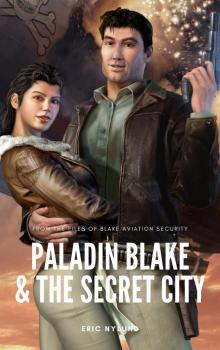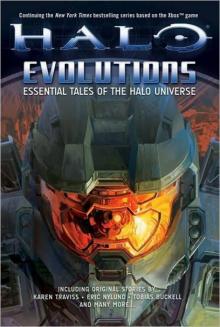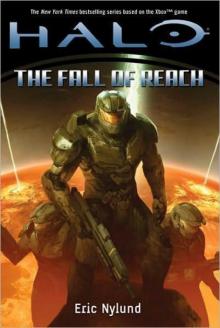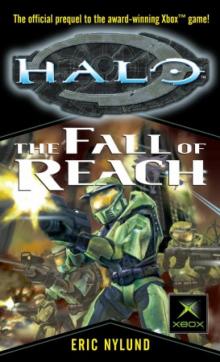- Home
- Eric Nylund
First Strike Page 11
First Strike Read online
Page 11
“I’m not ‘backing out,’” she shot back. “Our orders were given when the UNSC had a fleet, and when Reach was still an intact military presence. All that has changed.”
The Master Chief couldn’t disagree with what she was saying…but there was something else in her voice. And for the first time, John thought that Cortana might be hiding something from him.
“We have intact ship-scale plasma weapons and new reactor technologies,” Cortana continued. “Imagine if every ship could maneuver with pinpoint precision in Slipspace.” She paused. “The UNSC could be just as effective in space as you are in ground engagements. We could actually win this war.”
The Master Chief frowned. He didn’t like the Lieutenant’s or Cortana’s arguments—because they made sense. Aborting his mission was unthinkable. He had always finished what he started, and he’d always won.
As a professional soldier, John was ready to give up anything for victory—his personal comfort, his friends, his own life if that’s what it took—but he’d never considered that he’d have to sacrifice his dignity and pride as well for the greater good.
He sighed and nodded. “Very well, Lieutenant Haverson. We’ll do it your way. I hereby relinquish my tactical command.”
“Good,” Haverson said. “Thank you.” He faced the others and continued, “Sergeant? You, Polaski, and Locklear get back down to the Longsword and grab whatever gear wasn’t smashed to bits. Look for a field medkit, too, and then get back up here, double time.”
“Yes, sir,” Sergeant Johnson said. “We’re on it.” He and Polaski headed for the door, tapped the control, and let the panels slide apart.
Polaski shot a stare at the Master Chief over her shoulder; then, shaking her head, she followed the Sergeant.
“Shit,” Locklear said, checking his rifle as he loped after them. “Wait up! Man, I’m never going to get another hour’s sleep.”
“Sleep when you’re dead, Marine,” the Sergeant said.
The bridge doors sealed.
Haverson said, “Plot a course back to Earth, Cortana, and then—”
“I’m sorry, Lieutenant Haverson,” Cortana said. “I can’t do that. A direct course to Earth would be in violation of the Cole Protocol. Furthermore, we are not allowed an indirect route, either. Subsection Seven of the Cole Protocol states that no Covenant craft may be taken to human-controlled space without an exhaustive search for tracking systems that could lead the enemy to our bases.”
“Subsection Seven?” Haverson said. “I haven’t heard of it.”
“Very few have, sir,” Cortana answered. “It was little more than a technicality. Before this, no one had actually ever captured a Covenant vessel.”
“An exhaustive search of this vessel would be difficult under the circumstances,” Haverson said and cupped his hand over his chin, thinking. “It must be more than three kilometers long.”
“I have a suggestion, sir,” the Chief said. “An intermediate destination: Reach.”
“Reach?” Haverson quickly hid the shock on his face with a smile. “Chief, there’s nothing in that system except a Covenant armada.”
“No, sir,” the Master Chief replied. “There are…other possibilities.”
Haverson raised an eyebrow. “Go ahead, Chief. I’m intrigued.”
“The first possibility,” John said, “is that the Covenant have glassed the planet and moved on. In which case there might be a derelict, but serviceable, UNSC craft that we could repair and take to Earth. We’d leave the Covenant flagship in low orbit and return with the proper scientific staff and equipment to effect a salvage operation.”
Haverson nodded. “A long shot. Although the Euphrates did have a Prowler attached to her. They were supposed to launch a reconnaissance mission, before they got the signal to drop everything and help defend Reach. So maybe it’s not such a long shot, after all. And the other possibility?”
“The Covenant are still there,” the Master Chief said. “The likelihood that they would attack one of their own capital ships is low. In either event, there is no violation of the Cole Protocol because the Covenant already know the location of Reach.”
“True,” Haverson said. He paced to the center of the bridge. “Very well, Chief. Cortana, set course for Reach. We’ll enter at the edge of the system and assess the situation. If it’s too hot, we jump and find another route home.”
“Acknowledged, Lieutenant,” Cortana replied. “Be advised that this ship traverses Slipspace much faster than our UNSC counterparts. ETA to Reach in thirteen hours.”
The Master Chief sighed and relaxed a little. There was another reason for choosing Reach, one he didn’t reveal to the Lieutenant. He knew the odds of anyone surviving on the surface were remote. Astronomical, in fact…because once the Covenant decided to glass a planet, they did so with amazing thoroughness. But he had to see it. It was the only way he could accept that his teammates were dead.
A wash of static covered the Chief, first along his spine and then wrapping about his torso. There was an audible pop, and sparks crackled along the length of his MJOLNIR armor.
The Engineer released its grasp on him and chittered with excitement.
Diagnostic routines scrolled upon the Chief’s heads-up display. In the upper right corner the shield recharge bar flickered red and slowly filled.
“They work,” the Master Chief said. John was relieved to have his shields back. He wouldn’t forget what it was like to fight without them, though. It had been a wake-up call: not to become dependent upon technology. It was also a reminder that most battles were won or lost in his head, before he engaged any enemy.
“Impressive little creatures,” Haverson remarked. He scrutinized the Covenant Engineer as it floated toward the wall of displays and began tinkering with one. “I wonder how the Covenant caste system—”
“Sir!” Sergeant Johnson’s voice blasted over the COM, breaking with static. “You’ve got to get down to the Longsword ASAP. You and the Chief.”
“Are you under fire?” the Chief asked.
“Negative,” he replied. “It’s one of the cryotubes you recovered.”
“What about it, Sergeant?” Haverson snapped.
“Chief, there’s a Spartan in it.”
Chapter Ten
1852 Hours, September 22, 2552 (Military Calendar)
Captured Covenant Flagship, In Slipspace,
Location Unknown.
After the Chief had left to investigate the cryopod, Haverson made certain that the bridge doors locked. He turned and walked over to the Covenant Engineer who’d repaired the Master Chief’s armor.
“Fascinating creatures,” he murmured. He drew his sidearm and pointed it at the back of its head.
Two of the Engineer’s six eyes locked onto the muzzle of the weapon. A tentacle reached for it, split into fine probing threads, and touched the blue-gray metal.
Cortana asked, “What are you—”
Haverson shot the Engineer. The round tore through its head and spattered gore across the display the alien had been repairing.
“Haverson!” Cortana cried.
The other Engineer turned and squealed—then a blinking light on the broken display captured its attention and it returned to its work, oblivious.
Haverson knelt by the dead Engineer and holstered his gun. “I had no other choice,” he whispered. He touched the creature’s odd, slick skin. Its color faded from a faint pink to a cold gray.
He dragged it to the escape hatch, opened it, and placed the body in the corridor. He paused, and went back to fold its tentacles over its body. “I’m sorry. You didn’t deserve it.”
“Why was that necessary?” Cortana demanded.
Haverson stood, wiped his hands on his slacks, and sealed the escape hatch access. “I’m surprised you even have to ask, Cortana.” He heard the anger in his voice. He checked his rising ire. He wasn’t mad at Cortana; he was mad at himself—furious because of the ugly necessity of his act.
&nbs
p; “The Covenant are imitative—not innovative,” he said. “The Engineer you ordered to repair the Chief’s armor just got a first-hand look at our shield technology, a technology we stole from the Covenant and improved upon. If it somehow managed to rejoin the Covenant, that improved technology would be theirs. How would you like to see that technology manifest as better personal shields for their Elite warriors? Or on their warships?”
Cortana was silent.
“Corporal Locklear was right,” Haverson muttered. “I really hate this shit, too.”
“I understand,” Cortana finally replied, but her voice was so cold it could have frozen helium.
Haverson sighed and looked at his hands. The Engineer’s blood tattooed his skin with tiny pinpoints of blue-black. “Do you think that the Master Chief will find what he’s really looking for on Reach?”
“What do you mean ‘really looking for’?” Cortana said. Her voice was still frosty, but curiosity thawed her tone.
“I mean the other Spartans.” Haverson gave a short laugh. “True, his argument to go to Reach was valid—we wouldn’t be going otherwise. But that’s not what he’s after. He sent his team down to the surface of Reach…sent them to their deaths. What commander wouldn’t go back? And what commander wouldn’t hope that they were alive? No matter what the odds?”
Chapter Eleven
0930 Hours, September 4, 2552 (Military Calendar)
UNSC High Command (Highcom) Facility
Bravo-6, Sydney, Australia, Earth.
Two and A Half Weeks Ago.
Lieutenant Wagner walked through metal- and explosive-detector gates and into the atrium entrance of the large, vaguely conical structure. Officially designated UNSC HighCom Facility B-6, the sprawling edifice had been nicknamed “the Hive.”
It was overcast in Sydney. Gray light filtered in through the crystal dome overhead.
He marched past officers and NCOs moving with purpose to whatever destinations occupied their time. He ignored the displays of acacia trees and exotic ferns meant for the press and civilian tours. Today there was no time for pleasantries.
In another hour the apparent calm and efficiency of High-Com would be shattered into a billion pieces. Only a few of the brass knew that the UNSC’s mightiest outpost, Reach, was now nothing more than a cinder.
Wagner approached the receptionist’s station under the watchful eyes of a trio of armored Marine MPs.
Keeping Reach’s fate quiet was not the UNSC’s biggest secret, not by a country mile. Virtually no one in the civilian population of the Inner Colonies knew how perilously close they were to losing this war. ONI Section Two had done a brilliant job of preserving the fiction that Earth forces held their own against the Covenant.
And what did the citizens of the Outer Colonies think? Those who hadn’t fled to remote outposts and hidden privateer bases weren’t in any position to make trouble. The Covenant didn’t take prisoners.
“You’re expected today, Lieutenant,” the receptionist said. She was a young Chief Petty Officer and looked like she didn’t have a care, or a clue. But her eyes gave her away. She knew something. Maybe not what, but she had undoubtedly picked up on the increased security protocols…or the haunted looks in the eyes of her commanding officers.
“Please proceed to elevator eight,” she told him and returned her attention to the screen in front of her.
He made a mental note to find out who this perceptive person was and see if she could be recruited into Section Three. ONI had lost a lot of good people in the last few weeks.
Wagner moved to the solid steel wall, and a pair of doors parted for him. He entered the small room; the doors closed and locked with a whisper-quiet snik.
A fingerprint pad and retinal scanner extended from the wall. Wagner pressed his hand onto the scanner, and a needle stabbed his index finger. They’d check his DNA against the sample on file. He blinked once and then rested his chin on the retinal scanner.
“Good morning, Lieutenant,” a sweet female voice whispered in his ear.
“Good morning, Lysithea. How are you today?”
“Very well, now that I see that you have returned safely from your mission. I assume everything went as expected.”
“You know that’s classified,” he told the AI.
“Certainly,” she replied, her tone playful. “But I’ll find out anyway, you know. Why not save me the time and just tell me?”
Although he generally enjoyed this tête-à-tête with Lysithea, he knew it was part of the biometric scan, too. She scanned his brainwaves and voice patterns in response to her queries and matched them to older responses in her memory. She probably tested his loyalty in security measures as well—he didn’t put anything past Section Three; they grew more paranoid every day.
“Of course you’ll find out,” Wagner replied. “But I still can’t tell you. That would be a breach of security, punishable under Article 428-A. In fact,” he said in a more serious tone, “I’ll have to report this violation to my controller.”
She laughed, and it sounded like fine bone china clinking together. “You may proceed, Lieutenant,” she told him.
The doors parted and revealed a corridor lined with walnut panels and paintings of Washington Crossing the Delaware, Admiral Cole’s Last Stand, various alien landscapes, and space battles.
Although he had barely felt the descent, Wagner knew he had dropped three kilometers into the planet, through solid layers of granite, reinforced concrete, plates of Titanium-A, and EMP-hardened metal. None of this made him feel any safer, though; ONI’s research facility on Reach had the same setup, and it hadn’t done those poor bastards any good.
He stepped off the elevator. Lysithea whispered at his back: “Watch out in there. They’re looking to put someone’s head on a pike.”
Wagner swallowed and straightened the microscopic wrinkles in his uniform. He searched for a reason to delay—anything that would keep him out of the room at the end of this corridor. He sighed and overcame his inertia. No one kept the Security Committee for the UNSC waiting.
A pair of MPs snapped to as he approached the set of double doors. They didn’t salute, and their hands rested on their holstered sidearms. They stared straight ahead, but Wagner knew that if he twitched the wrong way he’d be shot first and questioned later.
The doors silently swung inward.
He entered, and the doors closed behind him and locked. Wagner recognized most of the brass seated at the crescent-shaped table: Major General Nicolas Strauss, Fleet Admiral Sir Terrence Hood, and Colonel James Ackerson. Vice Admiral Whitcomb’s chair was empty.
Another half-dozen officers were also present, and all were of command rank, which made Wagner nervous. Each had display tablets set before them, and even upside down, Wagner recognized his preliminary report and video records.
Wagner saluted.
General Strauss leaned forward and snapped off his display. “Christ! Did we know they had so many damn ships?” He banged a fist onto the table. “Why the hell didn’t we know about this? Who in ONI let this one slip by?”
Ackerson leaned back. “No one is to blame, General—except the Covenant, obviously. I’m more concerned with our response to this incursion. Our fleet was decimated.”
Ackerson’s reputation preceded him. Wagner had heard about the lengths to which he’d gone in the past to make sure his own operations got priority over Section Three’s. His rivalry with the SPARTAN-II program leader, Dr. Catherine Halsey, was the stuff of legend. Wagner thought Ackerson had been reassigned to a frontline post. Apparently he’d squirmed out of it. That was trouble.
Admiral Hood straightened and pushed his display away and finally acknowledged Wagner. He returned the salute. The Admiral was impeccably groomed, and yet there were dark circles under his eyes. “At ease, Lieutenant.”
Wagner tucked his hands behind the small of his back and moved his feet slightly apart, but otherwise didn’t relax a millimeter. One was never at ease when in the prese
nce of lions, sharks, and scorpions.
Hood turned to Ackerson. “Decimate is the wrong word, Colonel. We would have been decimated if we lost one ship out of every ten.” He voice rose slightly. “Instead, we lost ten of our ships for every one that managed to limp away. It was a total disaster!”
“Of course, Admiral.” Ackerson nodded, pretending to listen, and his eyes flickered over the report again. His eyebrows raised as he noticed the time and date stamp. “There’s one thing, however, I’d like answered first.” His glassy glare locked onto Wagner. “The time difference between the events in this report and now…” He trailed off, lost in thought. “Congratulations, Lieutenant. This is a new speed record from Reach to Earth. Especially when I know you took the time to perform the legally required random jumps before returning to Earth.”
“Sir,” Wagner replied. “I followed the Cole Protocol to the letter.”
That was a lie and everyone in this room knew it. ONI was always bending the Cole Protocol. In this case, it was probably justified because of the value of the intel. Still, if they wanted to crucify him, all they had to do was check the time logged on his Prowler’s engines and do the math.
Hood waved his hand. “That’s hardly the issue.”
“I think it is,” Ackerson snapped. “Reach is gone. There’s nothing between Earth and the Covenant now except a lot of vacuum—that and whatever secrecy we can preserve.”
“We’ll review Section Three’s practices later, Colonel.” Admiral Hood turned to Wagner. “I’ve read your report, Lieutenant. It is extremely detailed, but I want to hear it from you. What did you see? Are there any details you thought too sensitive to include in your report? Tell me everything.”
Wagner took in a deep breath. He had prepared for this and he related, as best he could, how the Covenant ships appeared in the system, the valiant efforts of the UNSC fleet defending Reach, how they failed and were systematically destroyed.

 A Thousand Drunken Monkeys: Book 2 in the Hero of Thera series
A Thousand Drunken Monkeys: Book 2 in the Hero of Thera series Paladin Blake & The Secret City
Paladin Blake & The Secret City A Thousand Drunken Monkeys
A Thousand Drunken Monkeys Halo: Evolutions - Essential Tales of the Halo Universe
Halo: Evolutions - Essential Tales of the Halo Universe Halo: The Fall of Reach
Halo: The Fall of Reach All That Lives Must Die mc-2
All That Lives Must Die mc-2 First Strike
First Strike The Fall of Reach h-1
The Fall of Reach h-1